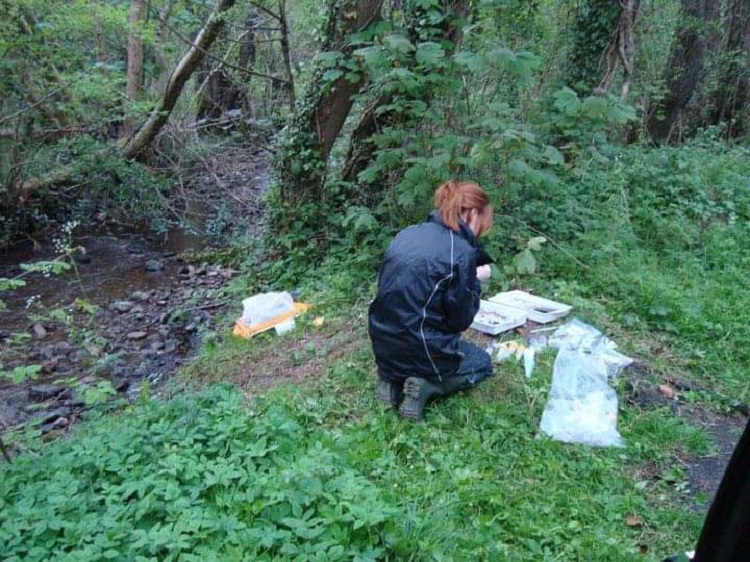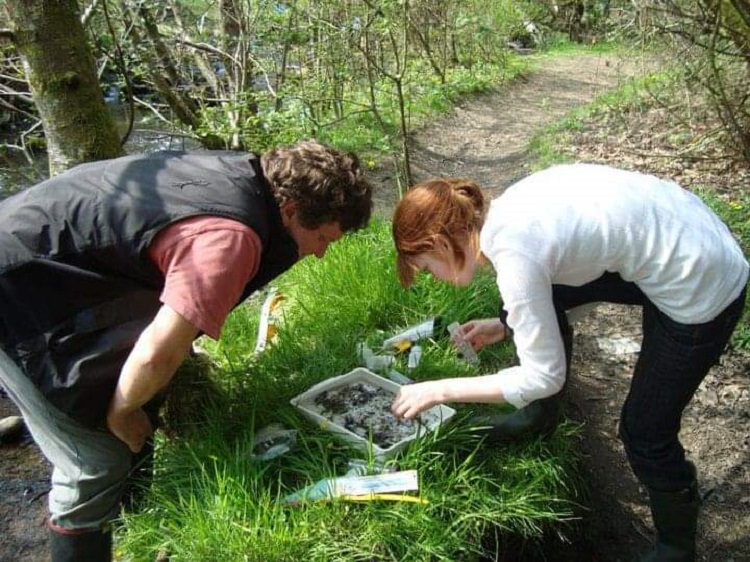Dr Valentine Seymour is a research scientist whose interests focus on the interface between human health, policy and the natural environment. Valentine began her scientific career with a BSc in Environmental Science from NRI at the University of Greenwich. She took five minutes out of her day to chat to NRI’s Communications Officer, Linden Kemkaran, about making the switch from arts to science, and how her idea of bliss is to have a good rummage in a river.
I’d had a passion since childhood to work with the aquatic environment. I was very lucky as I went to an ‘eco-school’, just down the road from Charles Darwin’s house in Downe, Kent. I was very influenced by the work of Darwin to the extent that I drove my mum absolutely bonkers, always fishing around in our local pond and bringing home samples of whatever I found in there!
I was incredibly passionate about freshwater species and coastal sciences, and that’s what drew me towards taking a degree in Environmental Science. When I read the University of Greenwich prospectus, the programme was given a huge double-page layout, dedicated to freshwater research that was going on in the River Medway. I immediately thought ‘right, that’s where I want to go’, as I was comparing it to other courses and they didn’t have the freshwater option.
where I want to go’, as I was comparing it to other courses and they didn’t have the freshwater option.
My passion has always been to understand the different species that live in rivers, how they are interrelated and what processes go on just beneath the surface of that body of water. I wanted to know the different effects that water quality has on these creatures and what improvements we can make to help them flourish. The NRI programme at Greenwich also contained a module on environmental impact assessment where I could learn about water management.
For A-Levels, I did English Literature, Language and Social Sciences, despite knowing I was drawn to more scientific subjects. My school kind of guided me down a set path and I didn’t feel able to change at that point. I applied to universities during clearing and I remember just picking up the phone and asking the person at the other end if I could speak to someone about BScs to see what my options were. I got a call back from Greenwich that same afternoon saying they had looked at my grades and that I was welcome onto their programme!
It represented a change in career for me going from the arts to the sciences and I was very excited, but a bit nervous. I began the academic year wondering if everyone else was going to know way more than me, but I spoke to quite a few of the lecturers and they all said look, don’t worry about it. They explained that the first year of any degree is just the foundation of knowledge and you build on that as you go. So I felt a lot happier and more confident – and of course, I had such passion for the subject!
Two of my lecturers – Dr Peter Burt and Professor Colin Hills – both of whom I’m still in contact with now – gave me such a high level of support and encouragement. My first year was very broad in terms of knowledge; it provided me with a solid understanding of the subject, giving me the basic skills and the necessary reading materials. There was a lot of lab work and field work, which I loved.
My first field trip was to the New Forest which was a great ice-breaker where we all got to know each other. It also introduced us to the environmental management of the New Forest and we did some invertebrate sampling in the rivers which was right up my street! The next trip was to the Lake District where we did a lot of aquatic monitoring as part of the freshwater science module.
Right from the beginning of the programme, there was a focus on where we might go in our careers after university. Dr Mike McGibbon, the Employability Officer, brought in external people to show us projects and talk about opportunities for graduates. I did some volunteering in one of the labs and through that I got to chat to the lab technicians and make contacts in other organisations – all very useful in terms of careers.
 I not only gained a degree from the University of Greenwich, I gained a husband too! He was in the year below me but we both remember receiving the same welcome speech which contained the immortal line, ‘you might even find your prospective partner whilst you’re studying here’, and in our case we did.
I not only gained a degree from the University of Greenwich, I gained a husband too! He was in the year below me but we both remember receiving the same welcome speech which contained the immortal line, ‘you might even find your prospective partner whilst you’re studying here’, and in our case we did.
It helps to have one eye on the future when you’re studying to help you navigate and find out what you like doing most. I went on to complete a Master’s degree in freshwater and coastal sciences at Queen Mary’s on a scholarship that came about directly from all my work at Greenwich. From there I had the confidence and contacts to complete my PhD at University College London. Now I’m a Research Fellow at the University of Surrey.
I enjoyed studying at different universities as it exposed me to different types of knowledge and methods – all of which of course, is entirely possible if you remain at the same place of learning – but it suited me to mix it up a bit. I’ve made a brilliant network of contacts which is incredibly useful, not just in terms of getting references, but in helping search out the best roles and meeting new people based on personal recommendation.
In my current job at the University of Surrey, I’ve just finished working on governmental environment policies with Defra and NHS England, trying to establish the link between nature and people’s health, and the impact that air quality has. We also looked at the unintended consequences of policy. My latest project is on smart technology and how we can adapt to the future in terms of environmental change.
Ideally, I’d like to stay within the field of environmental research, either in or outside academia. I’d like to gravitate back to aquatics, but I’ve found a real passion for the smart technology side of things too. For anyone reading this and considering a similar career, my advice would be to really look at the courses that are out there; study the universities’ prospectus and go to the open days as much as you can.
Speaking to the lecturers is the best way to see if you and the course ‘fit’ together. I’d thoroughly recommend the University of Greenwich as it is incredibly open and friendly, as well as rigorously academic, and it really listens to its students.
To find out more about:

